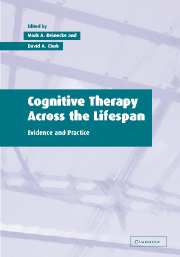Book contents
- Frontmatter
- Contents
- List of contributors
- Foreword
- 1 Cognitive therapy across the lifespan: conceptual horizons
- 2 Cognitive theory and therapy of depression
- 3 Cognitive theory and therapy of bipolar disorders
- 4 Regulation of emotion in generalized anxiety disorder
- 5 Cognitive theory and therapy of obsessions and compulsions
- 6 The cognitive model of panic
- 7 Treating obsessional problems using cognitive-behavioral therapy
- 8 Narcissistic personality disorder
- 9 Cognitive therapy and the self
- 10 Promoting cognitive change in posttraumatic stress disorder
- 11 Cognitive theory and therapy of social phobia
- 12 The cognitive model of bulimia nervosa
- 13 Cognitive therapy and schizophrenia
- 14 Cognitive-behavioral interventions for alcohol abuse and dependence
- 15 Cognitive approaches to understanding, preventing and treating child and adolescent depression
- 16 Cognitive-behavioral interventions in childhood anxiety disorders
- 17 Attention deficit/hyperactivity disorder
- 18 Cognitive-behavioral interventions for children with conduct problems
- 19 Processes of change in cognitive therapy
- 20 Cognitive therapy in the twenty-first century: current status and future directions
- Index
20 - Cognitive therapy in the twenty-first century: current status and future directions
Published online by Cambridge University Press: 05 July 2014
- Frontmatter
- Contents
- List of contributors
- Foreword
- 1 Cognitive therapy across the lifespan: conceptual horizons
- 2 Cognitive theory and therapy of depression
- 3 Cognitive theory and therapy of bipolar disorders
- 4 Regulation of emotion in generalized anxiety disorder
- 5 Cognitive theory and therapy of obsessions and compulsions
- 6 The cognitive model of panic
- 7 Treating obsessional problems using cognitive-behavioral therapy
- 8 Narcissistic personality disorder
- 9 Cognitive therapy and the self
- 10 Promoting cognitive change in posttraumatic stress disorder
- 11 Cognitive theory and therapy of social phobia
- 12 The cognitive model of bulimia nervosa
- 13 Cognitive therapy and schizophrenia
- 14 Cognitive-behavioral interventions for alcohol abuse and dependence
- 15 Cognitive approaches to understanding, preventing and treating child and adolescent depression
- 16 Cognitive-behavioral interventions in childhood anxiety disorders
- 17 Attention deficit/hyperactivity disorder
- 18 Cognitive-behavioral interventions for children with conduct problems
- 19 Processes of change in cognitive therapy
- 20 Cognitive therapy in the twenty-first century: current status and future directions
- Index
Summary
Introduction
In the last two decades cognitive-clinical psychology has made impressive gains in the scope of its application to diverse clinical disorders, the complexity of its theoretical formulations, and the sophistication of its research methodology. If one were to compare current cognitive theory, research and treatment with the earliest writings of Beck (1967), Ellis (1962), Meichenbaum (1977), Rehm (1977) and Mahoney (1974), there can be little doubt that we have come a long way from those first forays into the cognitive basis of psychological disorders. If one ever questioned whether cognitive therapy (CT) represented a paradigmatic shift in clinical psychology (Wilson, 1978), a look back over the last 20 or 30 years of research and treatment advances should dispel any doubt.
As evident from the chapters in the current volume, correlational and experimental investigations into the cognitive basis of clinical disorders represents a prominent research perspective that is evident across a wide range of psychological problems. Moreover, the basic elements of CT and cognitive-behavioral therapy (CBT) have been applied to a diverse group of disorders in children, adolescents, and adults. We have a much better understanding of the cognitive concomitants of certain clinical disorders, and of the role of cognition in the etiology, persistence, and severity of disorders. The more scientific and rigorous experimental methodology of information processing has been employed to test various cognitive hypotheses.
- Type
- Chapter
- Information
- Cognitive Therapy across the LifespanEvidence and Practice, pp. 507 - 528Publisher: Cambridge University PressPrint publication year: 2003
- 1
- Cited by



